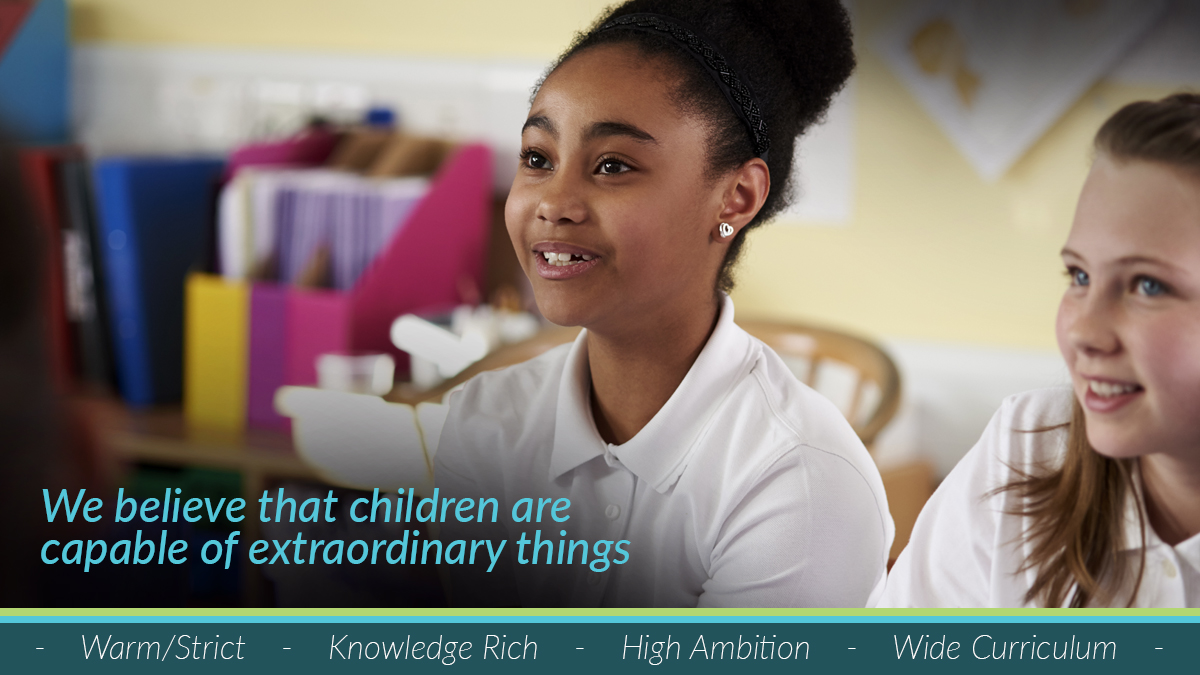The PTE Philosophy
We believe that children are capable of extraordinary things – they just need the right environment to flourish in. Schools have a major part to play in this, and parents and teachers must be key players in shaping our schools.
We want educational excellence for every child, and believe that this is achieved when all schools have a strong culture and a great curriculum, underpinned by four key mantras:
- Warm/Strict
- Knowledge Rich
- High Ambition
- Wide Curriculum
When schools are built on these foundations, every child should thrive, no matter their background or starting point. Here’s the detail of what that means and why it’s the right approach:
Warm/Strict: Love the children, while giving them clear structures to thrive within. Doing this enables pupils to be the best version of themselves all day, every day. They know how much people care about them, and how the school’s rules help them to succeed. Pupils know where they stand and how to do well – and the school supports them to achieve this, especially when they are finding it hard.
Knowledge Rich: This approach to learning ensures that every child is immersed in the best that has been thought, said, and done, building a foundation to understand the world they live in and deal with increasingly complex situations and ideas. It’s also how a child’s innate creativity is unleashed. Imparting rich knowledge is done through a carefully sequenced curriculum that allows interconnections to occur, providing every child with access to their birth-right: to be equipped with the life-long skills that enable them to engage and interact successfully with the world around them. Expert teachers plan subject-specific lessons, so that concepts are delivered in ways the children can understand and remember. In this way their knowledge and creativity grow over time.
High Ambition: Teachers recognise, and capitalise, on all the potential inherent in every child, preparing pupils for the best possible lives – expecting the best both from and for them, giving them the ambition to aim for the highest prizes, and supporting them to achieve their hopes and dreams. Everything about school should be designed to help young people do their best, whether it’s the lessons planned, the assemblies held, how pupils are encouraged to behave, or the exams they sit. Above all, it is instilling each child with high ambition, and avoiding what has been called ‘the soft bigotry of low expectations’.
Wide Curriculum: Literature, maths, science, humanities, languages, the arts, technology and more – these are the things that make us human, and which we want every child to understand and enjoy. A wide curriculum goes beyond even that, embracing all those other really important parts of education that enhance school life: sport, work experience, musical education, drama, chess, clubs and electives, guest speakers, competitions, assemblies, culture, concerts, trips. . . lashings and lashings of enriching experiences for everyone, not just privileged pupils.
These four mantras are what PTE stands for and are what we seek to help parents and teachers develop in their schools. There are already many shining examples of schools practicing them across the country. The key, we believe, is to bring out how each school can, by using them, achieve great results in their own way.
